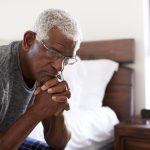
The high cost of — everything: Rising inflation rates are ramping up anxieties among some groups of Americans much more than others, a new study reports. Women, middle-age adults and people with less education or lower pay are feeling much more stress over higher prices, as well as people who were previously married but are now widowed, divorced or separated, according to findings published May 15 in JAMA Network Open. “In general, it’s vulnerable populations — people who are more exposed to changing prices,” said lead researcher Cary Wu, an assistant professor of sociology at York University in Toronto. For the study, Wu and his colleagues analyzed data on nearly 370,000 Americans who participated in the Household Pulse Survey conducted by the U.S. Census Bureau. The survey data revealed: Women were 30% more likely to be stressed by inflation than men. People who were widowed or divorced were about 50% more likely than married couples to be stressed, and those separated were twice as likely. People with a graduate degree were 40% less likely to feel the pinch from inflation than those with a high school diploma, while those with a bachelor’s were 50% less likely. As would be expected, family income also played a crucial role in feeling inflationary stress. About 66% of people earning less than $25,000 felt stressed regarding high inflation, compared… read on > read on >
























-300x200.jpg)













